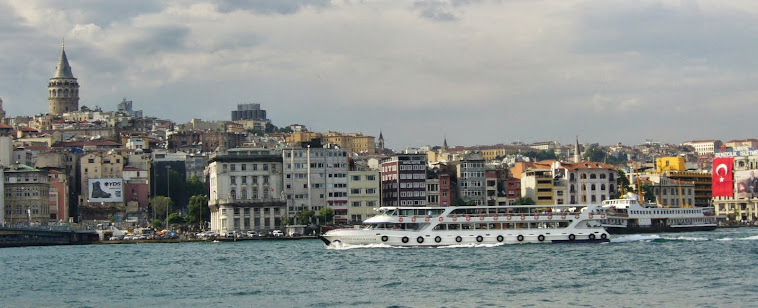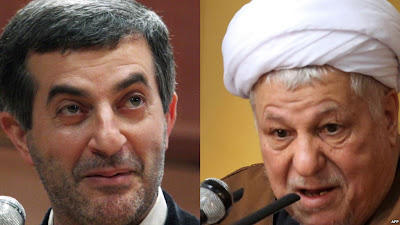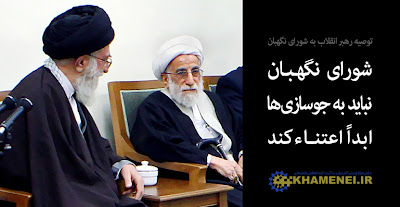Most newspapers in Tehran dedicated their main headlines to Ahmadinejad's violation of the election law. That was predictable, since he does not have many supporters in the Iranian mass media these days. 150 members of the majlis signed a petition asking for a vote of no confidence against the president for his repeated violations of the law.
 |
| Front page of Bahar (Spring) newspaper in Tehran: a pictorial conviction! |
But today I would like to talk about another important electoral event that might not get much press during the next few weeks. The 4
th elections for town and country municipal councils will be held on the same day as the presidential elections. While all the cameras were focused on the colorful presidential candidates and the elaborate fanfare at the Ministry of Interior, hundreds of nominees for the municipal councils were disqualified throughout the country. Most of those whose disqualification was announced yesterday belong to the reformist camps. These include sitting council members, former council members and state officials and ministers. In almost all cases the disqualifications were justified by a reference to section “J” and “D” of article 26 of the election law that requires the candidates to be “committed to the constitution of the Islamic Republic.” As one of the disqualified candidates put it in an interview with
Sharq newspaper yesterday, “quietly, they want to eliminate competition from the Councils election.”
 |
| The Councils were the brainchild of Ayatollah Taleqani. With his insistence, it was included in the Republic’s constitution as a way of decentralization of state power. He interpreted the famous Qur’anic verse (42:38): amruhum shura baynahum (run your affairs based on consultation) as the Islamic decree for democratic decision-making and a foundation for decentralization of state power. He believed that powerful councils will strengthen civil society and will contain state power. Taleqani died soon after the revolution and with him was buried the implementation of municipal councils power. Until, in 1998, after his first year in the office, as part of his reform agenda, President Khatami realized Taleqani’s dream. |
Following the phenomenal 80% participation in the presidential election, the first municipal elections drew close to 70% of the electorates to the polls for 3,300 councils throughout the country. The reformists won the absolute majority in almost all the councils throughout the country.
The second Councils’ election drew a telling picture of its failure. With an overall participation of 45%, only 11% of Tehran residents and 15% of other big cities cast their ballots. The important distinctions defined the second council elections in 2003. It attracted the lowest number of the electorates to the polls, but paradoxically, it was the only postrevolutionary elections in which not a single candidate was disqualified from the running. It constituted the freest election with the lowest rate of participation.
The winner of the second council elections was a new breed of conservatives. They won the majority of the seats in major cities, including in Tehran, with only 5% of the total electorates’ vote. They believed, in order to steer away the instruments of power from the reformists, they needed to mobilize a bottom-up campaign, running on a distributive justice agenda. The Tehran City Council elected an obscure character, Mahmoud Ahmadinejad as Mayor. Two years later he won the presidential election in a landslide against the politician par excellence of the Republic, Hashemi Rafsanjani.
The third election of the councils offered another surprise. While this time, the candidates were massively disqualified, the participation jumped from a nationwide of 45 to 60%, with major cities still lagging far behind of small towns and rural areas. The final tally indicated (233,000 candidates ran) that the reformists capture 40%, the independents and all shades of the conservatives each took 30% of all seats.
Two points are noteworthy in the Councils’ elections: first the high percentage of participation in small towns and rural areas, and second, the impressive success of women in running and being elected. More than 5,000 women were elected to the municipal councils.
In Shiraz, Arak, Hamedan, Zanjan, and Ardebil a woman candidate received the highest number of votes.
In Urumiyeh, women candidates won the first, second, and third seats, in Qazvin first, second, third, and fifth seats.
 |
A beauty products saleswoman, Arezu Babadi, an independent in Ahvaz,
came in second after a reformist candidate. As you can see, without any ambiguity,
her posters showed that she was determined to bring another color to the Council politics. |
 |
While the majority of women ran on reformist tickets, a significant number also ran independently. Speaking to the reporters after her victory, Mehrnoush Najafi of Hamedan attributed her success to her work in mosques to gain peoples’ trust and to know their pressing concerns. Sadly, a few months ago she had to resign after her hijab-less facebook pictures were posted on many website. The conservative members of the Hamedan Council asked for her resignation because her "nude" pictures had brought disgrace to the city!
|
More than 300,000 have nominated themselves for the 4th Councils’ election. Although only 12,000 of these candidates are women, an increase of more than 70% from the last elections, given their previous records, they are in good position to win a good number of seats, particularly in small towns. This time also there seems to be a significant consciousness about the contribution of women to a civil politics.
 |
E'temad newspaper ran a full page analysis of the sharp increase in women's participation.
No, this is not the line for Macy's latest White Flower sale, women in Isfahan waiting to
register their candidacy for the city's council. |
 |
Dr. Shahla Kazemipour is a demographer, specializing in women's mobility. She argues that
the surge in women's political participation is directly linked to their increasing rate of higher education.
60% of university students in Iran are women. |
As I said earlier, there is a distinction this time that women are speaking more and more explicitly about their participation as women. They emphasize that women could introduce a different kind of politics at least at the municipal level.
 |
Halimeh Aali, a physician who represents Zabol district of Sistan and Baluchistan in the Parliament.
She is the first woman elected from the region in the legislative branch.
Many people in Iran talk about the "Halimeh effect". |
 |
| In an editorial yesterday, she declares that: "Wherever there are women, there is peace and tranquility!" |

 |
Sakineh Omrani, representative of the small town of Samirom in central Iran, also is a vocal proponent of
women's political participation. In another op-ed yesterday, she insisted that:
"We need to institutionalize women's successful experience in political participation!" |
 |
Here are numbers of women candidates in the 4th Council's election.
The astonishing fact is the high numbers of participation in regional states.
In Kerman 1095 women have registeered, Fars 921, Gilan 777, Isfahan 713, Khorasan 592,
Sistan and Baluchistan 584, Khuzestan 550. |
I also want to show you how enthusiastic small remote districts are about the Council's election.
 |
| Click on Shushtar and see how the candidates publicize their campaign. |
 |
| You can monitor the election in Evaz, a town with 22000 population in central Iran. |
 |
Here is the website for the village of Fashkour near the city of Chalous in Caspian Sea region.
You will enjoy some nice music there, too. Make sure that you will cast your vote
if you happen to be in Fashkour next month. |
And last but not least, my American friends who would remember Sister Mary during the hostage crisis of 1979 should know that she was disqualified from running for her second term in Tehran City Council.
 |
The young Masumeh Ebtekar (Mary for Americans). She was the spokeswoman for the students
who took over the American Embassy in Tehran. |
 |
She went on to become a vocal environmentalist and served under President Khatami as his
environmental advisor. Here she is sitting next to Ahmadinejad's sister in a city council meeting in Tehran.
In Tehran the number of candidates reached 1950. As of
yesterday, 203 of them were disqualified.
|
Next time, I will explain the role of the Guardian Council
in the election and why many in Iran believe that they act unconstitutionally
in the process of vetting the candidates.
behrooz ghamari
























































